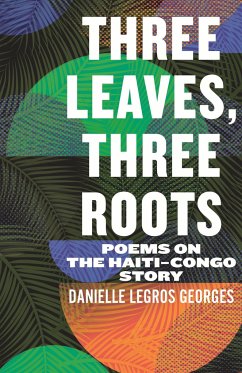A Haitian-born, Boston-based poet explores the personal and political stories of the Haitians who were part of Congo s 1960s decolonization movement
Between 1960 and 1975, thousands of Haitian professionals emigrated to Congo, a fellow Black francophone nation that emerged under the revolutionary new leadership of Patrice Lumumba. As Danielle Legros Georges writes in the introduction to this collection, these e migre s sought to escape repression in Haiti, start new lives in Africa, and participate in a decolonizing Congo. Among them were her parents.
Grounded in these personal and social histories, Three Leaves, Three Roots is a collection of Legros Georges s creative reconstructions of the Haiti-Congo experience. She interweaves her verses with excerpts from primary sources such as the interviews she conducted with the Congo e migre s and letters written by people both famous and obscure, including Lumumba, Fidel Castro, and members of Legros Georges s family.
The result is a richly layered portrayal of an era of decolonization and rebuilding, a time that sparked with both promise and vulnerability for the Pan-Africanist and Black Power movements. This collection is an important work of Haitian American poetry and of Black history: it reminds us, artfully, that movements of solidarity among people of color have always existed and always will exist.
Between 1960 and 1975, thousands of Haitian professionals emigrated to Congo, a fellow Black francophone nation that emerged under the revolutionary new leadership of Patrice Lumumba. As Danielle Legros Georges writes in the introduction to this collection, these e migre s sought to escape repression in Haiti, start new lives in Africa, and participate in a decolonizing Congo. Among them were her parents.
Grounded in these personal and social histories, Three Leaves, Three Roots is a collection of Legros Georges s creative reconstructions of the Haiti-Congo experience. She interweaves her verses with excerpts from primary sources such as the interviews she conducted with the Congo e migre s and letters written by people both famous and obscure, including Lumumba, Fidel Castro, and members of Legros Georges s family.
The result is a richly layered portrayal of an era of decolonization and rebuilding, a time that sparked with both promise and vulnerability for the Pan-Africanist and Black Power movements. This collection is an important work of Haitian American poetry and of Black history: it reminds us, artfully, that movements of solidarity among people of color have always existed and always will exist.








